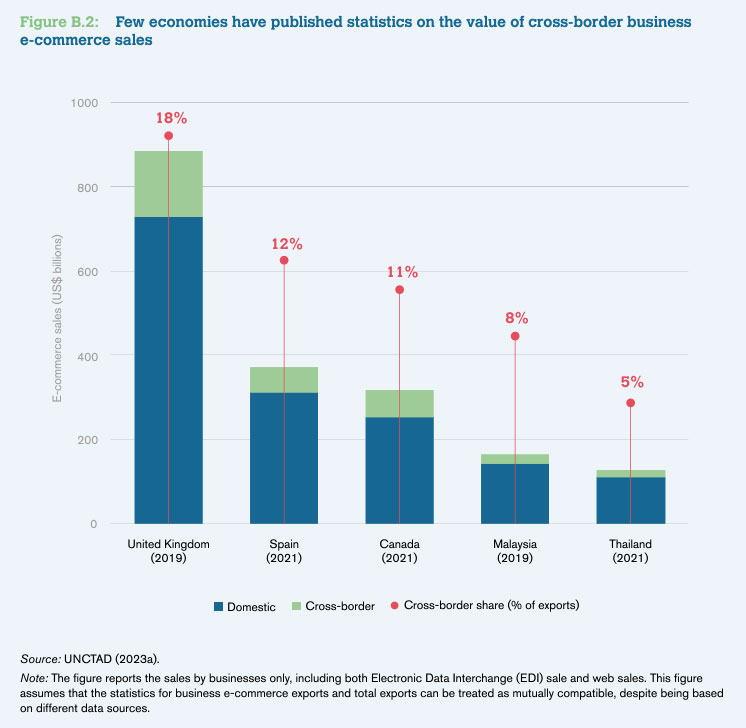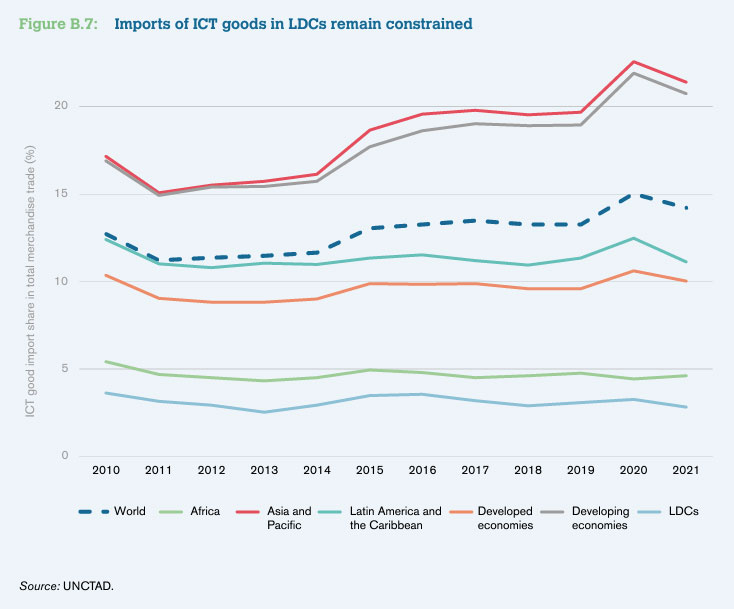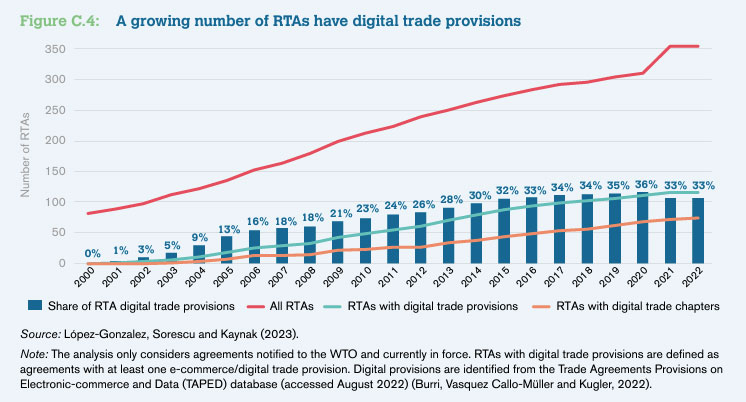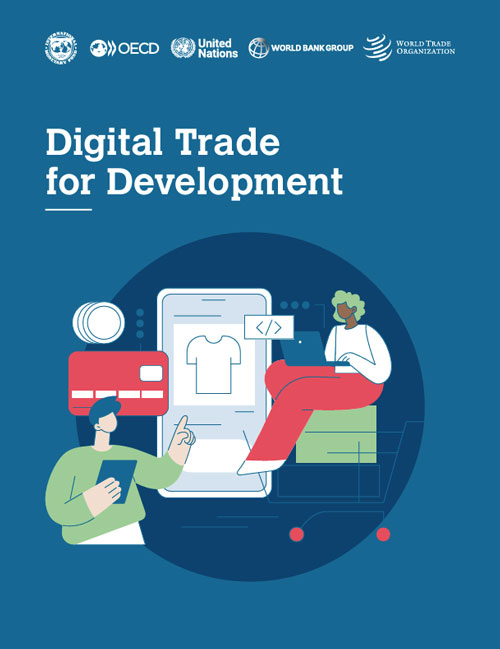How to use it
Digital Trade for Development
Published 20 February 2024
Digital trade is of increasing importance to the global economy, development, and trade growth, and especially in light of the WTO’s 13th Ministerial Conference later this month. This report briefs readers on the state of digital trade.
Here’s how to use the report entitled Digital Trade for Development.
Why is the report important?
Digital trade and digitalization are a growing and increasingly significant component of economic growth, including global trade. This report is important for understanding not only the significance of digital trade and the digital economy generally, but particularly how digital trade can help developing economies. Developing economies face greater challenges in accessing digital trade for growth, and this report is important in calling attention to the resources and work needed to enable and foster this growth. The report is also especially useful for understanding the regulatory challenges all economies face in finding an appropriate balance between enabling growth and ensuring trust and stability in the digital economy.
What’s in the report?
The report includes two principal sections:
Introduction; Unleashing the potential of digital technologies: growth, trade, and development opportunities
- Digital trade includes “all international trade transactions that are digitally ordered and/or digitally delivered” and is a dynamic and fast-growing area of the global economy, with the potential to drive trade growth at a time when merchandise trade growth is slowing; digitally-ordered trade’s shares of exports appear to be growing rapidly; this growth highlights the overall importance of digital technologies in the global economy and as a tool for supporting and enhancing resilience; digitalization is expected to expand further and with the rise of remote working, imported intermediate services are expected to increase. (pp. 6-7)
- Digitalization changes the way economies grow: adoption of digital technologies and digitalization changes the way economies grow by promoting growth in services, increasing productivity, fostering innovation, and boosting trade, including by lowering production and international trade costs, expanding market access and improving input-sourcing strategies, and facilitating lending, access to information, and exchanges of ideas. (pp. 8-9)
- Digital trade fosters growth by improving resource allocation, allowing economies to take advantage of economies of scale, foster innovation, technological diffusion, and access to education; digitalization strengthens resilience against increasingly frequent and intense unpredictable events; an economy’s growth potential relies on its capacity to adopt and use digital technologies. (pp. 8-9)
- Trade is increasingly digital but some economies struggle to be a part of this transformation: digitalization impacts how international trade is conducted, enabling buyers and sellers to place and receive orders globally; the terms “digital trade” and “e-commerce” are often used interchangeably; here, digital trade covers products digitally ordered and/or digitally delivered; “digitizable products” are those before digitalization (i.e., paper book), while “digitized products” applies to products after digitalization (i.e., e-books); improved data collection and more statistics are needed to understand digital trade and its role in stimulating economic activity. (pp. 10-12, Box B.1, Figure B.2)

- The contribution of digital trade to total exports varies considerably across economies; digitally delivered services as a component of trade are increasingly important and likely to increase, having already grown fourfold between 2005 and 2022 and at a faster pace than growth in goods and services exports; exports are dominated by high-income and a few emerging economies; LDC participation in exports of digitally delivered services is limited and growing less quickly than in other regions. (pp. 10 and 12-14, Figures B.3-B.5)
- Digital trade provides opportunities to launch new products: digital technologies have provided opportunities for a broad range of services to engage in trade; digital delivery is increasingly common and has had a significant impact on international trade in digitizable goods (ex: books and music), largely in developed economies; trade in goods underpinning digital technologies has grown by nearly 50 percent from 2012 to 2021, with the share of ICT goods trade varying across regions, led by Asia with limited trade from developing regions due to differences in technological development, industrial focus, and tariffs; some digital technologies reduce trade in goods while others can bolster it. (pp. 14-16, Figures B.6-B.7)

- Digital trade can help make trade more inclusive by creating new opportunities for developing economies; digital technologies can enhance e-commerce in LDCs by connecting remote economies to global markets; economies on the margins of global trade can harness export opportunities for digitally delivered products; digital trade can reduce the importance of factors of traditional comparative advantages, through use of tools like 3D printing, and bring forth new sources of comparative advantage, including quality digital infrastructure. (pp. 17-18, Figure B.8)
- Digital trade can make trade more inclusive by opening opportunities for greater participation of micro-, small- and medium-sized enterprises (MSMEs), women, and youth; MSMEs in developing economies are accounting for a relatively larger share in total exports as internet access improves, for example; strong growth in small parcel shipments reflects in part increasing participation of MSMEs in e-commerce; digital trade can provide women with increased access to global markets and flexible work opportunities by removing traditional barriers to entry; women tend to be more present in online marketplaces than offline, and social media can also enable individuals and MSMEs, including youth and women, to connect and collaborate globally. (pp. 19-20)
Role of domestic policies and international cooperation in supporting digital trade
- Governments increasingly recognize the potential of digital trade to contribute to economic growth and enhance competitiveness, and are adopting domestic policies to foster a conducive environment for leveraging digital technologies and platforms for cross-border digital transactions while grappling with the complexities of regulating digital trade. (p. 21)
- Many developing economies still face significant barriers to full engagement in digital trade, including inadequate digital infrastructure, limited digital skills, a deficient regulatory environment, and inefficient payment systems; addressing these barriers can contribute to development; international cooperation can play an important role in supporting developing economies to participate in digital trade by maximizing positive cross-border spillovers and minimizing negative ones through the exchange of knowledge, expertise, and resources. (p. 21)
- Investment in infrastructure and policies to ensure reliable and affordable internet access is key to digital trade growth; modern and reliable digital connectivity and ICT infrastructure, including through fiber-optic networks and advanced mobile telecommunications, is critical, but many developing economies lack access to these technologies and many people (2.6 billion, or one-third of the global population) do not have any access to the internet; even with internet access, the high cost of internet services hinders use in many countries; investment plays an important role in expanding and enhancing digital infrastructure to ensure widespread and reliable connectivity; comprehensive policies ensuring competition in the telecommunications sector and incentives for operators to supply low-income consumers are essential to fostering the use of digital networks; trade policies can promote digital connectivity by reducing trade barriers and fostering competition in telecommunications. (pp. 22-24, Figures C.1-C.2)
- Policies to support the development of digital skills of consumers and firms are crucial to facilitate digital trade: a high level of internet usage does not guarantee robust engagement of consumers and firms in digital trade, and lack of digital skills is an important barrier; developing the full range of digital skills, from basic to specialist, and integrating ICT training are critical for participation and make digital trade more inclusive and navigate the evolving demands of the labor market. (pp. 24-25)
- International cooperation can bridge the digital gap by enhancing digital connectivity and skills: financing digital connectivity is crucial to broaden its reach, enhance its stability and make it more affordable and can be done by pooling resources and expertise across borders; digital connectivity, including reducing tariffs on ICT equipment and developing infrastructure, is addressed in cooperative efforts under international trade agreements like the WTO’s Information Technology Agreement (ITA), in regional trade agreements, and through Aid for Trade; international cooperative efforts under the ILO, ITC, ITU, UNCITRAL, and others are helping economies develop skills needed to benefit from international trade; improving foreign investment environments and trade-related services sector policies is key to attracting private investment to develop connectivity. (pp. 25-26)
- A robust, well-defined, and effective domestic regulatory framework is crucial for a stable and secure digital trade environment and fostering trust and confidence among businesses and consumers, including addressing electronic authentication and signatures, consumer protections, privacy, and IP rules; an enabling regulatory environment magnifies the benefits of digital connectivity for trade, especially for digitally delivered services, but domestic regulatory environments are becoming more restrictive in many cases. (pp. 26-27, Figure C.3)
- Digital trade is increasingly disciplined through bilateral and regional trade agreements (RTAs) (33 percent of all RTAs as of 2022) covering a wide array of issues (i.e., privacy and data protection, cross-border data flow, and cybersecurity), though detailed digital trade provisions are limited to RTAs with high- and middle- income economies. (pp. 26-30, Figures C.4-C.5, Boxes C.1-C.2)

- Existing WTO agreements cover e-commerce even without specific references to it; GATS commitments cover digital trade in services, though many GATS commitments relevant for digital trade are nearly 30 years old and do not necessarily reflect actual services market conditions; trade in digitally ordered goods is subject to existing WTO rules on trade in goods, including MFN and national treatment; the TRIPS agreement covers trade in intangible digital products, particularly disciplines on the non-discriminatory availability of IP rights, and extends to products traded online and online commercial activity; most WTO members think existing WTO rules on digital trade need updating, with 90 members negotiating rules on trade-related aspects of e-commerce under a Joint Statement Initiative; new cooperative international trade initiatives, including the E-commerce Capacity Building Framework, have been launched to support developing economies’ participation in digital trade negotiations. (p. 29, Figure C.5)
- The WTO’s moratorium on customs duties on electronic transmissions is a key issue at its 13th Ministerial Conference in February 2024 (the deadline for extending or ending it); some members advocate in favor of the moratorium, citing its importance for a stable and predictable environment for digital trade, reducing trade costs and promoting innovation; others are against extension, raising concerns about foregone customs revenues, lack of clarity on scope of the moratorium and the definition of electronic transmissions. (p. 31)
- An assessment of the full impact of the moratorium calculating all potential losses and benefits is needed; although the scope and definition of electronic transmissions are uncertain under the moratorium, studies have estimated that the customs revenue loss from the moratorium is below 0.33% of overall government revenue on average; any assessment would have to take into account existing commitments in RTAs and other agreements like the WTO ITA, that separately impose a moratorium (currently binding 87 economies); domestic taxes like VAT and GST regimes offer another, non-discriminatory, way to collect revenue from digital trade that are unaffected by the moratorium and may completely offset any losses in customs revenue caused by the moratorium; less-developed economies face challenges implementing these taxes effectively; imposing customs duties on electronic transmissions would reduce relevant digital trade and lower its benefits. (pp. 31-35, Table C.1, Figures C.6-C.7)
- Digitally ordered goods trade can benefit from the full implementation of the WTO Trade Facilitation Agreement (TFA) as the speed and cost at which digitally ordered goods are traded and delivered are influenced by the efficiency of customs and logistical procedures, while trade facilitation tools can lower trade costs and boost digitally ordered goods transactions; the TFA has promoted digitalization in border processes worldwide, estimated to have reduced trade costs by 4.5 percent, though automation and streamlining of border procedures remains a work in progress in lower-income economies, requiring more implementation assistance from Aid for Trade, UNCTAD, and other efforts. (pp. 34 and 36)
- Digital trade raises regulatory issues concerning cross-border data flows, competition, and online consumer protection that could benefit from deeper international cooperation. (p. 36)
- Cross-border data flows are pivotal to the expansion and efficiency of digital trade, as access to comprehensive data is becoming a source of comparative advantage; cross-border data flows raise policy concerns including privacy, consumer protection, competition, cybersecurity, and national security, prompting economies to condition data movement or mandate domestic data storage; four different approaches to regulating data flows have been adopted worldwide: 1) absence of regulation, 2) “open safeguard” regulations allowing transfers while holding entities accountable for data misuse, 3) “pre-authorized safeguards” requiring government approval before data transfer, and 4) ad-hoc authorizations allowing transfers on a case-by-case basis; this fragmentation in approaches hinders data protection and digital trade, underscoring the need for increased international cooperation, especially in light of many multinational agreements incorporating rules on data flows. (pp. 36-38, Figure C.8)
- Competition policy fostering a transparent and pro-competitive business environment is vital for supporting and developing the digital economy, stimulating innovation and a culture of continuous improvement; digital trade’s growth has been fueled by new business models and products based on digital platforms offering consumers a wide range of services which allow sellers access to global markets and greater efficiency, but also exert and concentrate significant market power across segments of the digital economy and large data streams; high market concentration in the digital economy raises challenges for market players and consumers; governments are seeking ways to regulate the digital economy to address related competition concerns and strengthen enforcement against anti-competitive conduct; international cooperation between competition authorities is crucial to addressing these challenges as digital platforms transcend borders. (pp. 38-39)
- Enhancing online consumer protections builds trust in digital markets, while lack of protection erodes trust and hinders digital trade growth; online consumer protection policies aim to provide consumers in the digital realm the same level of protection as those in traditional commerce, including regulations against online deceptions, disclosure requirements, and liability regimes; effective enforcement and international cooperation is essential, as online sales cross borders; some international instruments already set out guidelines and best practices; enhanced cross-border collaboration among consumer protection authorities is crucial for enforcement and addressing violations across multiple jurisdictions, though such collaboration remains limited. (pp. 39-41)
- With respect to each of these regulatory issues, developing economies, especially the least developed countries (LDCs), face challenges, including resource constraints, in adopting and enforcing policies and laws needed to address them; more technical expertise, policy formulation assistance and support, infrastructure, and other resources are needed to enable them to successfully address these cross-border challenges. (pp. 38-40)
How to apply the insights
-
This section is dense with information about the challenges that developing economies, including LDCs, face in accessing opportunities in digital trade, the efforts underway to bolster their capacity, and also the landscape that all economies face in developing the best regulatory framework for addressing the unique challenges of the digital economy.
-
This section also contains a short passage about the importance of digital payment systems for digital trade.
-
Policymakers and negotiators can use this information to quickly gain an understanding of the key issues for the digital economy and for how to target efforts to help developing economies engage and grow in digital trade.
Conclusion
The Digital Trade for Development report provides a brief but comprehensive and highly useful assessment of the current role of digital trade in the global economy, the rules in place and under consideration to regulate the digital economy, and the opportunities and challenges for developing economies with respect to digital trade.
Complementary reports and analysis
Hinrich Foundation
- Prepare to pay more for digital services
- E-commerce and LDCs: The different speeds of greater integration
- Meet Tara Tiefholz: Connecting the real world of e-commerce to trade policy
External Resources
-
Trade in Services for Development: Fostering Sustainable Growth and Economic Diversification – World Bank Group and World Trade Organization
A report focused on the benefits and opportunities of services trade for developing economies. -
World Trade Report 2023: Re-globalization for a secure, inclusive, and sustainable future – World Trade Organization
Trade fragmentation threatens to unwind growth and development. -
WTO E-Commerce Tariff Moratorium at 25 – Progressive Policy Institute
Members should continue their current practice of not imposing customs duties on electronic transmissions.
© The Hinrich Foundation. See our website Terms and conditions for our copyright and reprint policy. All statements of fact and the views, conclusions and recommendations expressed in this publication are the sole responsibility of the author(s).
